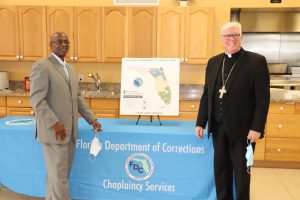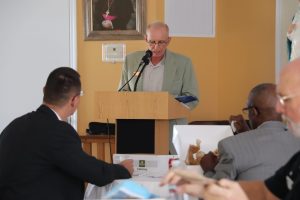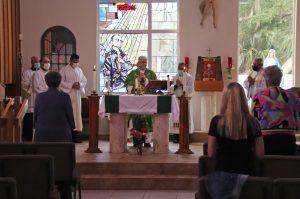The Diocese of Venice is stepping up to provide a pre-recourded Catholic Mass at prisons throughout the State of Florida is helping incarcerated men and women gain spiritual strength during a time when they are isolated as never before.
 This was the message given from Florida Department of Correction (FDOC) State Chaplain Johnny Frambo to Diocesan Prison Outreach Volunteers during a gathering on Oct. 30, 2020 at St. Maximilian Kolbe Parish in Port Charlotte.
This was the message given from Florida Department of Correction (FDOC) State Chaplain Johnny Frambo to Diocesan Prison Outreach Volunteers during a gathering on Oct. 30, 2020 at St. Maximilian Kolbe Parish in Port Charlotte.
“Since the COVID began, you have done a great deal,” Frambo explained. “You didn’t get behind the fence; but you were behind the fence in so many other ways.”
Frambo explained how the Diocesan Prison Outreach, with the direct support of Bishop Frank J. Dewane, worked to provide a variety of resources to the FDOC to ensure that there was continued access to religious materials and programming that volunteers would normally provide.
The effort included the donation, from a member of the faith community, of televisions as well as the ability to create and upload programs to prison tablets through a program called JPAY. Each state inmate is provided with a tablet through JPAY which provides controlled access for content such as emails, video visitation and other services without wireless services.
 This effort was facilitated by Diocesan Prison Outreach Co-Coordinators Bob Hiniker and Joe Mallof, with the assistance of Anne Chrzan, Diocese Director of Religious Education. Items for upload include the Mass and religious education programming and other materials which focused on the teachings of the four pillars of the Catechism of the Catholic Church. This meant that the effort was developed from scratch and uploads to the tablets through the FDOC. This religious education programming is part of a larger effort to increase access to Catholic content for prisoners in the state facilities during the Pandemic and beyond.
This effort was facilitated by Diocesan Prison Outreach Co-Coordinators Bob Hiniker and Joe Mallof, with the assistance of Anne Chrzan, Diocese Director of Religious Education. Items for upload include the Mass and religious education programming and other materials which focused on the teachings of the four pillars of the Catechism of the Catholic Church. This meant that the effort was developed from scratch and uploads to the tablets through the FDOC. This religious education programming is part of a larger effort to increase access to Catholic content for prisoners in the state facilities during the Pandemic and beyond.
“Thank you for all you have done and continue to do to help those men and woman to hear your spiritual voice and guidance during this time of inner discovery and self-improvement before they go back into the world and restart their lives as transformed individuals,” Frambo concluded.
Before the COVID-19 global Pandemic effectively shut down access by volunteers to prisons and jails, some 150 volunteers, including 26 priests and 11 deacons, assisted with religious education and formation at 10 jails, six state prisons and four work camps. These volunteers normally provide a variety of religious programs, such as Bible study, religious education and assistance with formation before receiving the Sacraments including as Baptism, First Holy Communion and Confirmation, as well as the Mass. Bishop Dewane regularly visits prisons for Mass and confers the Sacraments when possible.
Hiniker shared an update on how each prison and jail policy has evolved in recent months with some allowing limited volunteer access while others remain off limits.
“We have adapted many of our programs in the best way possible, but we are limited based on the restrictions each facility has,” Hiniker added.
 Bishop Dewane, who celebrated Mass for the volunteers, praised the group for choosing to answer a specific call from God to serve the incarcerated, those who are often marginalized or forgotten by society.
Bishop Dewane, who celebrated Mass for the volunteers, praised the group for choosing to answer a specific call from God to serve the incarcerated, those who are often marginalized or forgotten by society.
“They are as much a part of this Diocese as anyone else and must have access to pastoral care, which you provide through your selfless dedication as volunteers,” Bishop Dewane said. “You do not go there to solve what put them there. It is not important why they are there. It is important that they are placed before us and we have to be that instrument of the Lord – the evidence of God’s love to others.”
Hiniker and Mallof also presented information about two different outreach programs that are starting to be introduced in the state prisons including grief sharing and an effort to help the incarcerated transition to life after prison.
The Grief Share program is a 13-week process designed to help the incarcerated deal with different types of grief they may face, such as for whatever crime they may have committed, for the loss of freedom, for the loss of connection to family, the death of loved ones and much more.
The Bridges to Life is a re-entry program which promotes healing for the incarcerated and for victims, aiding and placing them in the positive mindset that they will be able to succeed and become productive citizens again. This mentoring effort also helps to prepare those about to be released for the realities of the modern world of technology and transitioning back into society and the workforce. A key component of this effort is the prepare former inmates how to answer questions about their incarceration on job applications and then to handle job interviews.
If you are interested in learning more about the Diocesan Prison Outreach, or perhaps becoming a volunteer, please contact Bob Hiniker at hinbob5@hotmail.com or Joe Mallof at mallofjt@comcast.net.





